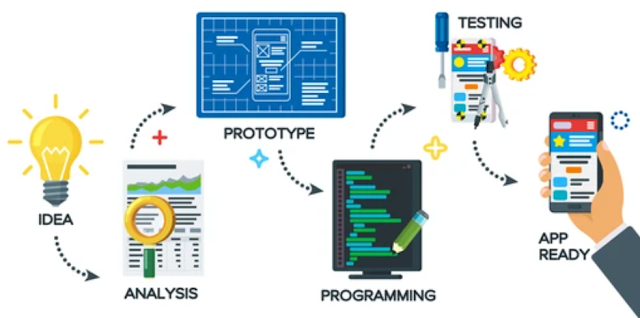The Future of Mobile App Development: Emerging Technologies to Watch
The future of mobile app development is incredibly exciting, with emerging technologies poised to revolutionize the way we interact with mobile apps. Here's a detailed explanation of some key emerging technologies that will shape the future of mobile app development:
Artificial Intelligence (AI) and Machine Learning (ML):
AI and ML have already made significant strides in mobile app development, and their influence will continue to grow. AI-powered apps can offer personalized recommendations, intelligent chatbots, voice assistants, and predictive analytics. ML algorithms enable apps to learn from user behavior, making them smarter and more intuitive over time.
Augmented Reality (AR) and Virtual Reality (VR):
AR and VR technologies are transforming the mobile app experience by merging the digital and physical worlds. AR allows for overlaying digital content on the real world, while VR creates immersive virtual environments. Mobile apps can leverage AR for interactive product visualization, games, and navigation, while VR can provide immersive training experiences, virtual tours, and entertainment.
Internet of Things (IoT):
The IoT ecosystem continues to expand, connecting everyday objects to the internet. Mobile apps act as a central hub for controlling and monitoring IoT devices, enabling users to interact with their smart homes, wearables, industrial sensors, and more. IoT integration in mobile apps opens up new possibilities for automation, data collection, and seamless connectivity.
5G Technology:
The advent of 5G networks promises ultra-fast internet speeds, low latency, and increased bandwidth. This technology will enable mobile apps to deliver richer content, support real-time streaming, and enhance user experiences. With 5G, mobile apps can leverage technologies like AR, VR, and real-time communication to create more immersive and responsive experiences.
Blockchain Technology:
Blockchain technology is not limited to cryptocurrencies; it has the potential to transform mobile app development as well. Blockchain can enhance security, transparency, and data privacy in mobile apps. It enables secure transactions, decentralized app architectures, and tamper-proof data storage, making it ideal for applications like supply chain management, financial services, and digital identities.
Edge Computing:
Edge computing brings computational power closer to the source of data generation, reducing latency and improving app performance. Mobile apps can leverage edge computing to process data locally, ensuring faster response times and reducing reliance on cloud services. This is particularly useful for applications requiring real-time data processing, such as IoT, AR, and AI.
Progressive Web Apps (PWAs):
PWAs are web applications that provide a native app-like experience through web browsers. They offer the advantages of cross-platform compatibility, instant updates, and offline functionality. PWAs are gaining popularity as they bridge the gap between web and mobile apps, allowing developers to build robust apps accessible across different devices and platforms.
Voice User Interface (VUI):
Voice assistants like Siri, Alexa, and Google Assistant have become increasingly popular, and VUI technology is becoming more sophisticated. Mobile apps can integrate VUI to provide voice commands, natural language processing, and voice-controlled interactions. VUI offers hands-free operation and accessibility, making it an essential feature for future mobile apps.
Wearable Technology:
Wearable devices like smartwatches, fitness trackers, and AR glasses are becoming more prevalent. Mobile apps can seamlessly integrate with wearables to provide personalized experiences, health monitoring, notifications, and contextual information. Developers can leverage wearable technology to create innovative apps that cater to users' specific needs and preferences.
Cross-Platform Development Tools:
Cross-platform development tools like React Native, Flutter, and Xamarin have gained popularity, allowing developers to build apps for multiple platforms using a single codebase. These tools streamline the app development process, reduce time and cost, and enable faster deployment to various operating systems.
The future of mobile app development is driven by these emerging technologies, offering exciting possibilities for enhanced user experiences, improved app performance, and innovative functionality. Developers who stay updated with these trends and leverage these technologies will be at the forefront of the mobile app development landscape.





.png)





